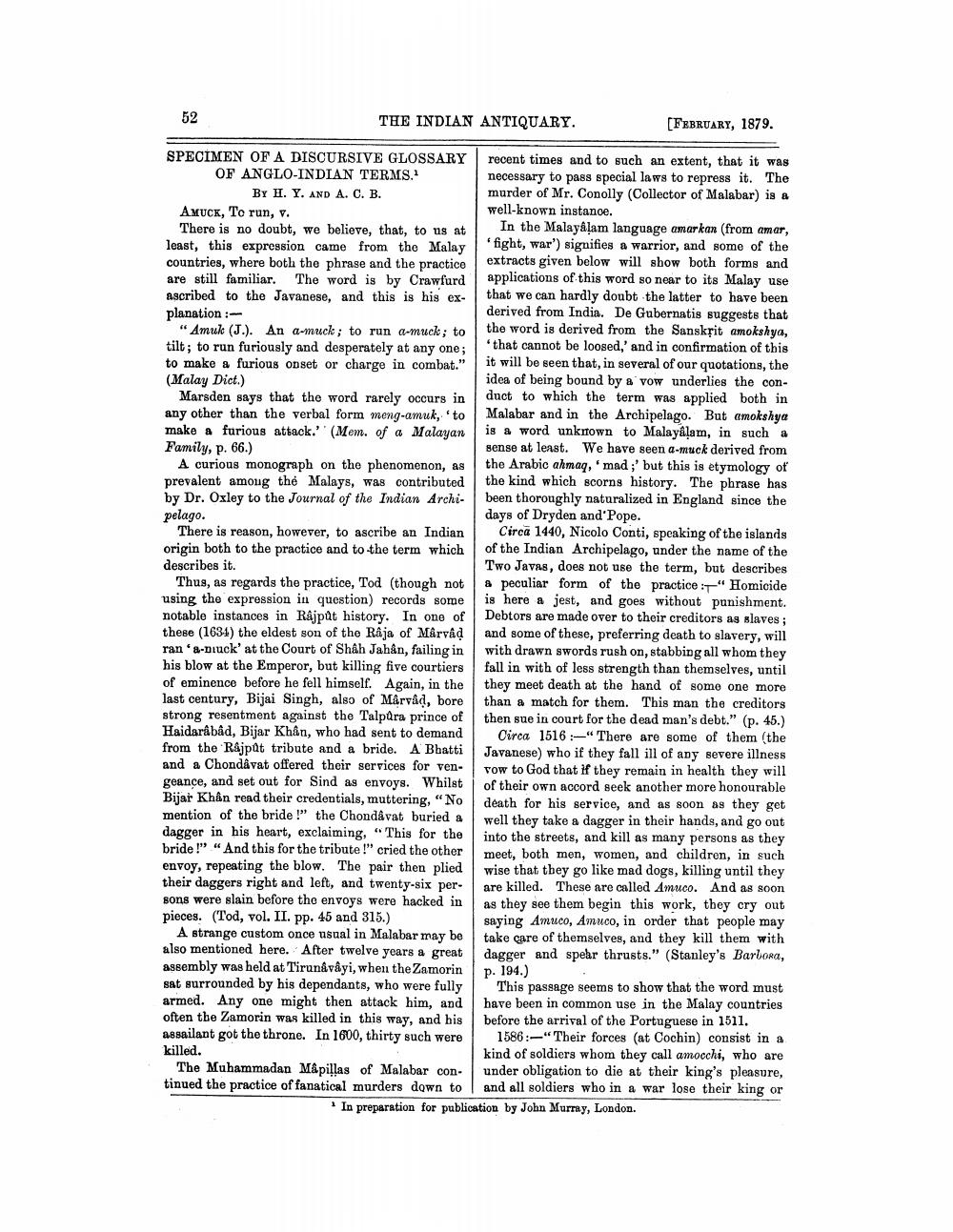________________
52
THE INDIAN ANTIQUARY.
(FEBRUARY, 1879.
SPECIMEN OF A DISCURSIVE GLOSSARY recent times and to such an extent, that it was OF ANGLO-INDIAN TERMS.
necessary to pass special laws to repress it. The BY H. Y. AND A. C. B.
murder of Mr. Conolly (Collector of Malabar) is a AMUCE, To run, v.
well-known instanoe. There is no doubt, we believe, that, to us at
In the Malayalam language amarkan (from amar, least, this expression came from the Malay
'fight, war') signifies a warrior, and some of the countries, where both the phrase and the practice
extracts given below will show both forms and are still familiar. The word is by Crawfurd applications of this word so near to its Malay use ascribed to the Javanese, and this is his ex- that we can hardly doubt the latter to have been planation:
derived from India. De Gubernatis suggests that "Amuk (J.). An a-muck; to run a-muck; to
the word is derived from the Sanskrit amokshya, tilt; to run furiously and desperately at any one;
that cannot be loosed,' and in confirmation of this to make a furious opset or charge in combat." it will be seen that, in several of our quotations, the (Malay Dict.)
idea of being bound by a vow underlies the conMarsden says that the word rarely occurs in duct to which the term was applied both in any other than the verbal form meng-amuk, 'to Malabar and in the Archipelago. But amokshya make a furious attack.' (Mem. of a Malayan is a word unknown to Malayalam, in such a Family, p. 66.)
sense at least. We have seen a-muck derived from A curious monograph on the phenomenon, as the Arabic ahmaq, mad;' but this is etymology of prevalent amoug thé Malays, was contributed the kind which scorns history. The phrase has by Dr. Oxley to the Journal of the Indian Archi- been thoroughly naturalized in England since the pelago.
days of Dryden and Pope. There is reason, however, to ascribe an Indian Circa 1440, Nicolo Conti, speaking of the islands origin both to the practice and to the term which of the Indian Archipelago, under the name of the describes it.
Two Javns, does not use the term, but describes Thus, as regards the practice, Tod (though not & peculiar form of the practice:" Homicide using the expression in question) records some is here a jest, and goes without punishment. notable instances in Rajput history. In one of Debtors are made over to their creditors as slaves; these (1634) the eldest son of the Raja of Mårvad and some of these, preferring death to slavery, will ran & Diuck' at the Court of Shah Jahan, failing in with drawn swords rush on, stabbing all whom they his blow at the Emperor, but killing five courtiers fall in with of less strength than themselves, until of eminence before he fell himself. Again, in the they meet death at the hand of some one more last century, Bijai Singh, also of Mårvåd, bore than a match for them. This man the creditors strong resentment against the Talpara prince of then sue in court for the dead man's debt." (p. 45.) Haidarâbâd, Bijar Khan, who had sent to demand Circa 1516 :-" There are some of them (the from the Rajput tribute and a bride. A Bhatti Javanese) who if they fall ill of any severe illness ana a Unondavao ouered their services for ven- vow to God that if they remain in health they will geance, and set out for Sind ag envoys. Whilst of their own accord seek another more honourable Bijar Khân read their credentials, muttering, "No death for his service, and as soon as they get mention of the bride !" the Chondâvat buried &
well they take a dagger in their hands, and go out dagger in his heart, exclaiming, "This for the into the streets, and kill as many persons as they bride!" "And this for the tribute !" cried the other meet, both men, women, and children, in such envoy, repeating the blow. The pair then plied wise that they go like mad dogs, killing until they their daggers right and left, and twenty-six per- are killed. These are called Amuco. And as soon Bons were slain before the envoys were hacked in as they see them begin this work, they cry out pieces. (Tod, vol. II. pp. 45 and 315.)
saying Amuco, Amuco, in order that people may A strange custom once usual in Malabar may be take care of themselves, and they kill them with also mentioned here. After twelve years a great dagger and spear thrusts." (Stanley's Barbora, assembly was held at Tirunâvâyi, when the Zamorin p. 194.) . sat surrounded by his dependants, who were fully This passage seems to show that the word must armed. Any one might then attack him, and have been in common use in the Malay countries often the Zamorin was killed in this way, and his before the arrival of the Portuguese in 1511. assailant got the throne. In 1600, thirty such were 1586:-" Their forces (at Cochin) consist in a killed.
kind of soldiers whom they call amoochi, who are The Muhammadan M&pillas of Malabar con under obligation to die at their king's pleasure, tinued the practice of fanatical murders down to land all soldiers who in a war lose their king or
In preparation for publication by John Murray, London.




